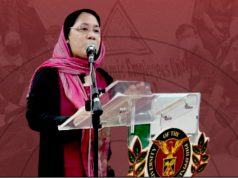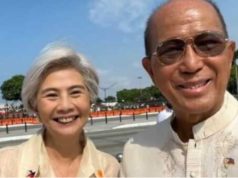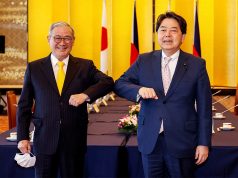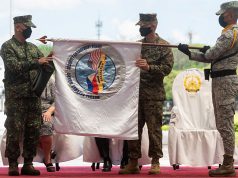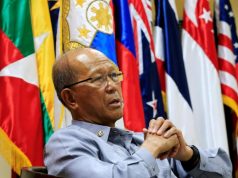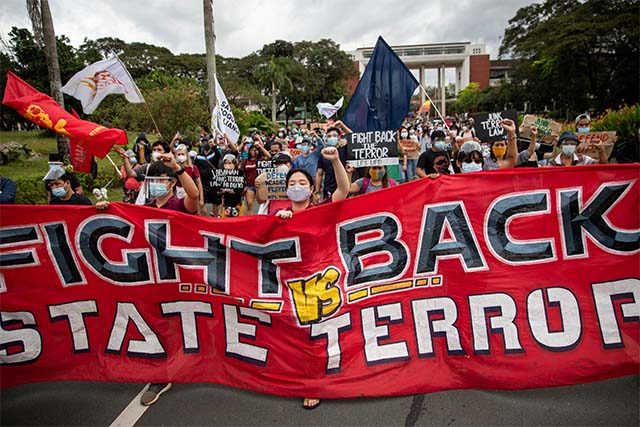
Filipinos remembered the historic events that led to the long-running accord between the University of the Philippines and the Department of National Defense after the latter terminated the agreement Monday evening.
In a surprise gesture, Defense Secretary Delfin Lorenzana sent a letter to UP President Danilo Concepcion informing him that the deal had been scrapped since January 15.
The 1989 UP-DND accord was signed by then UP President Jose Abueva and Defense chief Fidel Ramos that prohibits state forces from entering its campuses except in cases when university officials allowed the entry, in hot pursuit and other similar emergencies.
In the letter, Lorenzana alleged without proof that some UP students were identified members of the Communist Party of the Philippines-New People’s Army and that the country’s premier university became a recruitment ground for communist rebels.
JUST IN: In a letter addressed to UP Pres. Danilo Concepcion, Department of National Defense (DND) Secretary Delfin Lorenzana says the UP-DND Accord, an agreement that keeps state forces from entering the premises of the University, is terminated effective January 15. #DefendUP pic.twitter.com/1EGyaJDwSY
— Philippine Collegian (@phkule) January 18, 2021
The government official further claimed that the CPP-NPA is using the accord as a “shield” that prevents law enforcement from conducting operations against its alleged members.
The Anti-Terrorism Council (ATC), the group formed by virtue of the controversial Anti-Terrorism Act of 2020, had declared the CPP as a terrorist organization last year.
The official also viewed this as the government’s way to convince the youth to trust the police and the military again despite having just ended the accord that provides the UP community’s protection in the past decades.
“We want them to see their Armed Forces and Police as protectors worthy of trust, not fear,” Lorenzana said.
Such decision immediately triggered an outrage from activists, youth groups and other progressive organizations who seek to uphold the UP-DND accord.
The hashtags #DefendUP and #NotoCampusMilitarization dominated the trends list on Twitter Philippines as they denounced the termination of the longstanding agreement.
From the Diliman Commune to the UP-DND accord
Amid the outrage that erupted following the termination of the UP-DND accord, some UP alumni and current students recalled incidents that served as precedents to this deal.
Some activists cited a series of rallies at UP-Diliman in Quezon City nearly 50 years ago that initiated the student activism in UP.
Diliman Commune (February 1-9, 1971) turns 50 this year.
When tyranny becomes law, RESISTANCE BECOMES DUTY. pic.twitter.com/PVsgOvMVig
— Leonard Javier #StopTheKillings ✊ #HealthForAll ⌬ (@STPbasileo) January 18, 2021
It has been 50 years but until today, the Diliman Commune lives.
State violence will never destroy the fortress that is UP. Fascists and dictators are toppled, ousted, defeated but the University of the People will remain.
Long live the Diliman Commune! #DefendUP pic.twitter.com/NSKGG2VCD3
— Lucia Silva (@theluciasilva) January 18, 2021
On Feb. 1 to 9, 1971, student activists and faculty members of the UPD who joined the jeepney strike confronted and challenged members of the Quezon City Police and the now-dissolved MetroCom troops for their intrusion into the campus, according to an old post by UP’s official Facebook page. This uprising was called the Diliman Commune.
The students formed human barricades for more than a week to prevent the entry and harassment from law enforcement.
“The barricades [from February 3-9] served as the climax to the series of dramatic challenges which characterized student activism in the University of the Philippines. After the barricades, there were no more forms of dissent that could surprise the UP administration,” the UP’s post on Diliman Commune read.
Years later, on June 16, 1989, Donato Continente, a former staff of the Philippine Collegian, was also arrested by the police and the military inside the same institution, specifically at the Vinzons Hall.
Continente was accused of being involved in the ambush of US army Col. James Nicholas Rowe in April of that year.
Based on his account, Continente was tortured into confessing the crime when the police detained him at the Camp Crame in Quezon City. He was eventually released in 2005 after a 14-year sentence.
Days after Continente was arrested, on June 30, 1989, former UP President Abueva and former DND Secretary Ramos agreed and signed the pact that mainly bars the entry of the military and the police without prior notification or permission of the UP administration.
This succeeded a previous accord between student leader Sonia Soto and former defense minister Juan Ponce Enrile in 1982 during the martial law.
Some alumni of UP and former staffs of the Philippine Collegian, such as professor Danilo Arao recounted their experiences then.
“As a news writer of the Philippine Collegian, I remember the abduction of our staff Donato Continente on the night of June 16 at Vinzons Hall. He was tortured and forced to confess to the killing of Col. James Rowe. This is why the UP-DND accord was signed 14 days later,” Arao wrote.
Government’s threats vs UP
Some Filipinos, meanwhile, cited the persistent threats of the Duterte administration against the university as the main importance of such agreement.
Mainstream media reporting the termination of UP-DND accord, I hope to see some context here that UP students have constantly been endangered by state officials’ red-tagging pronouncements. Not enough to echo Lorenzana’s claims and accept these hook line and sinker
— Cristina Chi (@chicristina_) January 18, 2021
In June 2020, the effectivity of the accord was tested after state forces forcibly entered the UP campus in Cebu to arrest seven protesters.
In November of that year, President Rodrigo Duterte also threatened to defund the state-run institution, citing the same accusation of it recruiting students to join the CPP-NPA.




